|
|
|
Sort Order |
|
|
|
Items / Page
|
|
|
|
|
|
|
| Srl | Item |
| 1 |
ID:
157478
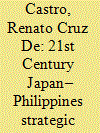

|
|
|
|
|
| Summary/Abstract |
The Philippines and Japan have evolved a security partnership in the face of China's maritime expansion in the South and East China Seas. The two countries pursue this security partnership through regular bilateral consultations among Philippine and Japanese heads of states, political leaders, defense ministry officials, and high-ranking military officers; joint naval exercises; and exploratory discussions for arms transfers and negotiations for a Status of Forces Agreement (SOFA) between Japan and the Philippines. Initially, Article 9 of Japan's 1947 Constitution hindered this security partnership. However, a recent reinterpretation of the pacifist constitution now allows Japan a collective self-defense “particularly to export arms to its allies and security partners and to deploy the JSDF overseas when necessary. Now, the challenge for Japan and the Philippines is to ensure the viability of their security partnership in the light of Philippine President Rodrigo Duterte's efforts to improve his country's relations with China.
|
|
|
|
|
|
|
|
|
|
|
|
|
|
|
|
| 2 |
ID:
157481
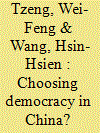

|
|
|
|
|
| Summary/Abstract |
We argue that the choice of electoral rules in Chinese villages results from the incentives that rural party elites face in their efforts to control electoral results. Using the rationalist approach, we propose four conditions under which they will adopt an institution that allows for electoral uncertainty: a large proportion of revenue from village-owned enterprises (VOEs), a large size of electorate, the presence of strong social groups, and frequent upper level government interventions. We use the 2011 Wukan incident to illustrate our argument. The cross-sectional analysis of survey data of 961 villages provides some evidence for the hypotheses: A larger number of labor force and frequent inspections by the upper-level government are significantly correlated with an increase of the likelihood that a village party leader allows villagers to freely nominate candidates. Theoretical and policy implications will be discussed in the end of this paper.
|
|
|
|
|
|
|
|
|
|
|
|
|
|
|
|
| 3 |
ID:
157482
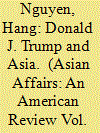

|
|
|
|
|
| Summary/Abstract |
This paper seeks to examine candidate Trump's campaign rhetoric about Asia and President Trump's policy toward Asia. It will look at Trump's announcements during his presidential campaign and show that Trump, the candidate, had made various proposals on the U.S. approach to China and American allies in Asia, which had made Asian capitals deeply concerned. In the Asian view, if Trump's campaign promises were realized, the world would be characterized by political tensions, trade protectionism, and arms races. The paper goes on to examine the Trump administration's foreign policy toward American allies in Asia and toward China. It demonstrates, that though the United States are being governed by a new administration—The Trump administration—the U.S. national interest and constitution do not change. President Trump and his administration have found it necessary to maintain many elements of Obama's Asia policy for U.S. interests.
|
|
|
|
|
|
|
|
|
|
|
|
|
|
|
|
| 4 |
ID:
157480
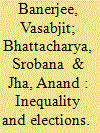

|
|
|
|
|
| Summary/Abstract |
This article investigates the causes of India's Maoist insurgency and its changing dynamics. To explain its origins, we empirically test three hypotheses using cross-state-level data: inequality of wealth in states; inefficient state government; and, disgruntled provocateurs. Our analysis reveals that insurgency is caused by inequality of wealth in states, not inefficient state governments and disgruntled provocateurs. Subsequently, we study variations in the number of Maoist attacks and the selected targets in the eastern Indian state of West Bengal using newspaper reports of events. Our analysis demonstrates that the numbers of incidents and the type of targets selected depend on electoral competition between regional political parties and their interactions with Maoists. The findings, therefore, indicate that whereas inequality of wealth can explain the insurgency's presence in states, political competition within states could explain its dynamics.
|
|
|
|
|
|
|
|
|
|
|
|
|
|
|
|
| 5 |
ID:
157477
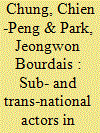

|
|
|
|
|
| Summary/Abstract |
This paper provides a political analysis on two territorial disputes that South Korea has with Japan over Dokdo/Takeshima and with China over Iŏdo/Suyan Rocks, as well as on their implications for the Northeast Asia region, focusing on the roles of sub-state actors and the United States as a third party trans-national actor. It mainly explores why South Koreans consider territorial claims by Japan and China such an affront as to require strident demonstration of ownership, especially since they already exercise effective control over the territories under dispute. It also explores what actions the South Korean government would take in the event of maneuvers or attempted landings by security forces or nationalists/fishing boats from China on Iŏdo or Japan on Dokdo. Employing Robert Putnam's Two Level Game Framework, the paper provides comparative insights on how these cases have been developed to date through interactions between Level I, official negotiators, and Level II, sub- and trans-national actors. The two cases demonstrate that the state is not a unified actor, and non-state actors' nationalistic collective sentiment has played (and will play) a greater role in shaping the directions of (potential) conflicts over Dokdo and Iŏdo.
|
|
|
|
|
|
|
|
|
|
|
|
|
|
|
|
| 6 |
ID:
157476


|
|
|
|
|
| Summary/Abstract |
This article attempts to decipher the meaning of Taiwan's January 2016 general elections by focusing on the factors that underscored the landslide victories by the opposition DPP party over the long-time ruling KMT. The ultimate aim is to answer the larger question of how to understand Taiwan's politics from the perspective of democratic theory. Two of the attributes that a true democracy must have are: (1) an opposition party loyal to the common weal of society, as opposed to the party's own egoistic interests; and (2) an independent free media. My study fails to find either in Taiwan under the shadows of DPP's maneuverings.
|
|
|
|
|
|
|
|
|
|
|
|
|
|
|
|
| 7 |
ID:
157479
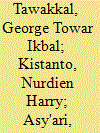

|
|
|
|
|
|
|
|